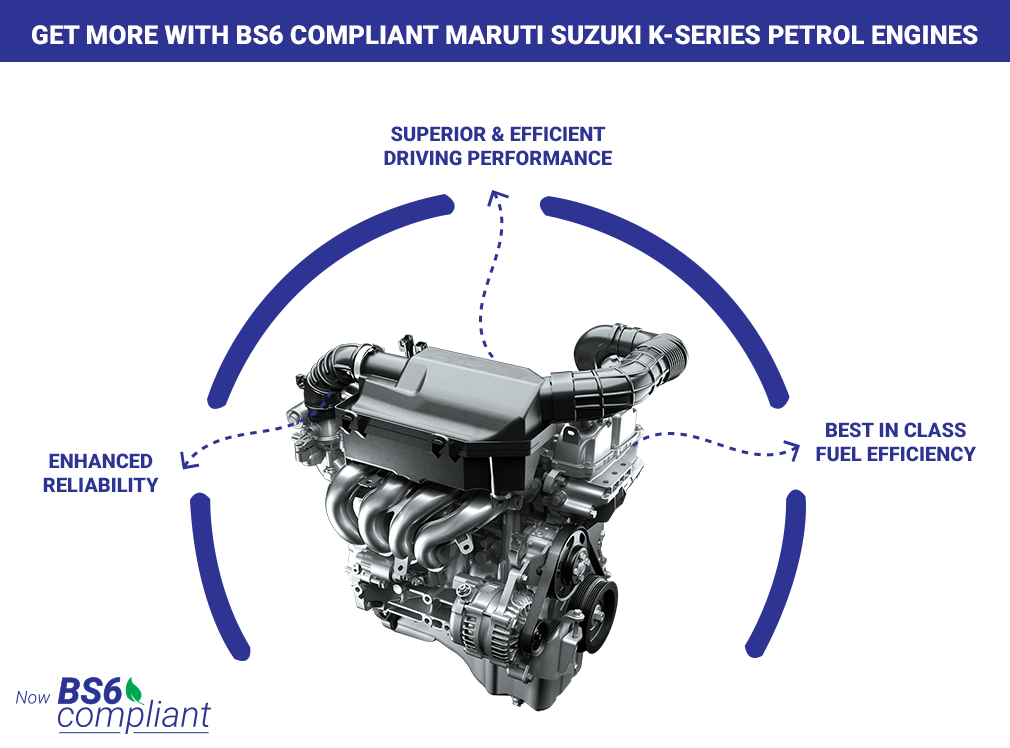Successfully sent!
Thank you for your interest in Maruti Suzuki Arena .

India has entered a new era of greener mobility with the BS6 emission norms coming into effect from April 1st, 2020. In the BS6 era, petrol engines are upgraded to emit 25% less NOx (Nitrogen Oxides) as compare to diesel engines.
This leap from BS4 to BS6 has been a big one for the Indian auto industry because upgrading the engines to meet BS6 norms is challenging – it requires a lot of changes like bigger catalytic converters and upgraded exhaust systems, to name a few.
Why Choose a BS6 Petrol Car?
For car buyers, this switch to BS6 poses the most common question yet again – which car to buy, petrol or diesel? There are many reasons to go for a petrol car.
First of all, petrol cars have always fared better in terms of emissions - they produce lesser NOx and particulate matter. And now, with BS6 in place, petrol cars have become cleaner and greener for the environment.
The second reason is the buying and maintenance costs. A diesel car is generally ₹ 1-1.2 lakhs more expensive to buy as compared to a petrol equivalent model. The overall maintenance is also higher. In fact, even the cost of insurance is higher in diesel cars on a year-on-year basis. All of this adds up to higher ownership cost in the long run.
Thirdly, the price gap between petrol and diesel has also been a major factor for many car buyers. However, this price difference has reduced from ₹25 to ₹7 in the last 8 years. And with the latest price revision in Delhi in May’20, the price difference between petrol and diesel is less than ₹2 per litre! Keeping all this in mind, petrol cars represent a more sensible choice.
Maruti Suzuki’s Progressive Transition to BS6
At Maruti Suzuki, the transition to BS6 had started a whole year ahead of the mandated deadline. In April 2019, the BS6-compliant Baleno and Alto 800 were launched. By January 2020, there were 10 BS6 cars available in Maruti Suzuki’s BS6 line-up and since then, the Ciaz, Ignis and Vitara Brezza have been added to the BS6 line-up.
As India’s largest car manufacturer, Maruti Suzuki is aligned with the Government’s vision of green and sustainable mobility and based on the popularity of BS6 cars, so are India’s car buyers. Maruti Suzuki has already sold over 7.75 lakh BS6 cars to date!
Get More with Maruti Suzuki BS6 Petrol Engines
Maruti Suzuki’s range of BS6 compliant K-Series petrol engines is built with innovative design techniques and cutting-edge engineering. This helps deliver optimized engine performance which is tuned for and suited to Indian driving conditions.
Here are the 3 key benefits that K-Series petrol engines offer: -
Enhanced Reliability
Every petrol engine within the K-Series lineup has been rigorously tested for lakhs of kilometres for performance, durability, and wear and tear. In fact, K-Series lineup of petrol engines are time-tested and power over 6.3 million Maruti Suzuki cars across different segments.
Better Performance and NVH
With better thermal efficiency and enhanced engine stiffness, the K-Series lineup of petrol engines offers refinement, smooth driving performance and improved NVH (Noise Vibration and Harshness) characteristics.
Best-In-Class Fuel Efficiency
Thanks to all-aluminium engines, use of low friction oils, and a host of superior components integrated within these petrol engines, the K-Series lineup of petrol engines deliver class-leading fuel efficiency figures.
The future begins now with Maruti Suzuki’s BS6 petrol engines!
*This article is for reference purpose only
Simply add your email address into the box below and click Subscribe. You will be sent an OTP mail to the below entered Email ID.
Thanks for subscribing to The Maruti Suzuki Arena World. We hope that your experience with us is a delightful one.